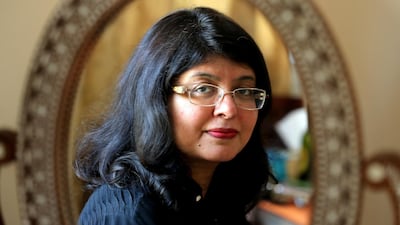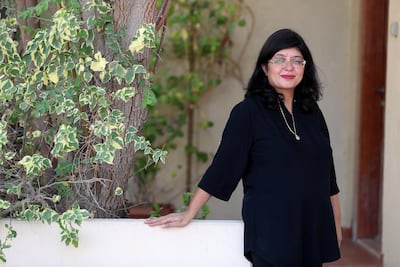It’s not unexpected that chartered accountant Deepti Malhotra, who deals with money all day, has an avid fascination with investing - but she is astounded that most of her friends do not share her passion.
“Here in Dubai,” says the 48-year-old married Indian, who has lived in the UAE for 15 years, “my women friends - except for one or two - are hesitant, uncomfortable or unconfident talking about matters relating to money and finances.”
Yet, she says, “almost all are confident shoppers and high spenders”. “If I start talking about stocks and investments, they don’t know or don’t want to tell. But they are very open about buying expensive bags or property.”
A 2016 study by North American investment platform TD Direct found that 80 per cent of women do not have an investment portfolio.
Yet, when women do invest, they do a better job than men, according to a 2018 study by Warwick Business School in the UK. Women trading shares and funds made a 1.94 per cent average gain above the market compared to men’s 0.14 per cent, it found.
So why do so many women fail to invest their money?
A 2018 study by UK challenger bank Starling examined 300 articles in the press and found that women were defined as excessive spenders in more than two-thirds of articles aimed at them, with tips for thrifty bargains, coupons and discounts.
Articles aimed at men, meanwhile, focused on investing, it found, with 70 per cent of articles aimed at them emphasising that making money was masculine.
“When women shop, it’s seen as being frivolous,” Anne Boden, Starling Bank’s chief executive, wrote in the bank’s Make Money Equal campaign. “But when men spend similar sorts of money on big purchases, they’re ‘investments’.” Yet the bank’s data demonstrates little difference in the way men and women spend on a day-to-day basis, she says.
For all that women are portrayed as reckless spenders and men as canny investors, the truth is that most major financial spending decisions are made by women alone, or by women in discussion with the men in their family, says Heather McGregor, executive dean of Edinburgh Business School at Heriot-Watt university and author of Financial Advice for Independent Women.
“It is unthinkable in the 21st century that women do not have major influence in all those decisions,” she says. But often, she adds, they feel ill-equipped to make investing decisions.
As a financial educator, Ms McGregor says she lacks not the expertise but the time to stay on top of everything needed to invest, such as currency movements, world stock markets and interest rates. She does, however, hire a female financial adviser to help with her portfolio, who does not make her feel “patronised or stupid”.
A lot of what women spend on is “family stuff”, says Rasheda Khatun Khan, a wealth and wellness planner and founder of Design Your Life, as they tend to focus on the “experiential” part of life.
But she stresses that kind of spending is needed. "When we get to the end of our life you're not going to say, 'I've got $1 million [Dh3.7m] in my pension,' but you will remember a cruise you went on. It's part of the fulfilling way of living."
Ms Khan also says that for many couples in the UAE, the men tend to be the main breadwinner, so investments come out of their income, while variable expenses and the household costs come out of a woman's additional income. Ultimately, though, if men are spending on saving or investing, "it's still spending".
“I think a lot of females still hope that the man will provide, so their money is to play with,” says Heidi-Jane Hill, a 48-year-old Briton living in Barsha who is married but financially independent after 11 years in the UAE.
Her rental income, both overseas and in Dubai, supports her lifestyle, but she is also frugal in terms of bills and groceries, allowing Dh11,000 in all, with “everything spare” going into a savings account.
“Working in Dubai is full on,” she adds. “I think how women let off steam is often to treat themselves to that fancy bag or blow dry. If women could see what a small change to their routine can allow them to save, maybe they would feel more empowered to think about their personal finance more.”
When men get together they often discuss investments and the stock market "and it’s kind of cool", says Ms Hill. “Women on the whole just don’t do that," she adds.
Ms McGregor urges women in the UAE, particularly expatriates, to give “serious thought” to their pension provision, which can be “adversely affected” by years away from their home country.
Women in their 60s in the UK, for example, have an average of just £51,100 (Dh235,600) in their private pension pots while men have more than three times as much - £156,500, according to UK retirement research body the Pensions Policy Institute (PPI) in what it calls the "part-time pension penalty".
And when it comes to women setting up their own businesses, Ms Boden of the UK's Starling Bank says it is “no wonder” that investment in female-founded start-ups is so low, when investors of both genders are being taught that women are less reliable with money.
Female founders received just 2.2 per cent of the $130 billion of venture capital funding made last year, according to the Pitchbook private capital database, a global financial data and software company.
Yet Heather Henyon, founder of the Women’s Angel Investor Network (Wain), an investor network for females in the Mena region, says women have demonstrated to her they are “solid investors”.
Wain targeted women investors when it launched six years ago, she says, as it was investing in female founders. But having women investors has proven to be a surprising factor in the “strong investor returns” Wain has since enjoyed, with its portfolio performing at an average (although unrealised) threefold return.
Ms Malhotra, who runs her own financial management consultancy and lives in the Springs in Dubai, says she started investing by experimenting with buying into companies’ initial public offerings (IPOs) straight out of university in Delhi in the early 1990s, like everyone else in her workplace. “During lunch, the whole office, both men and women, would actively discuss avenues of savings,” she says.
“Individual IPOs weren’t a wise thing to do but we were young. I made some good investments and one or two bad. ICICI Bank has done well - I bought for 100 rupees and get good dividends still.”
She stopped investing for several years when she had her daughter, now 24, but these days Ms Malhotra is back in the market, buying exchange-traded funds (ETFs) rather than individual stocks. She still occasionally dabbles in stocks, recently buying 1,000 shares in General Electric when they dropped to $12.88.
One way for women to dip their toes into the water would be to set up an investment club, advises Ms McGregor. It would provide both a challenge and an education, and is an “excellent way” to learn about investing without risking huge amounts of money.
Would-be investors tend to put in Dh300-Dh400 a month each, then meet every few weeks to agree how to invest the pot.
After all, she says, women are “inherently more social creatures” so meeting other women to chat about money, the very thing Ms Malhotra and Ms Hill say doesn’t tend to happen, would be a better way to spend an hour than going shopping - even with a money-off coupon.


